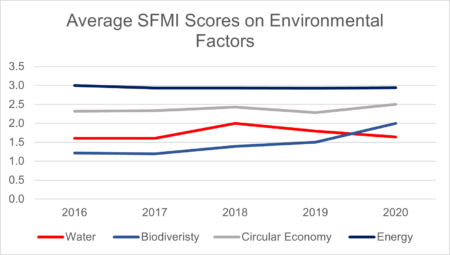The SFMI are pleased to announce a new partner, Methven UK, to raise the awareness of water management and identify the value that FM can bring to this increasing risk. Methven UK is a leading designer and manufacturer of specialist equipment to monitor, measure and manage water consumption. As part of the Australian GWA Group, they’re committed to conserving water and energy to protect the planet for generations to come.
Why this partnership with The SFMI?
Throughout the past 8 years of SFMI assessments, water management has consistently seen low scores across all the FM companies audited, even from leading partners. From the last 5 years the average yearly score has remained stagnant at below 20% and falling even while other typically low scoring topics such as biodiversity are on the increase. Water management is a challenge that can often be side-lined in pursuit of other agendas. Providers will tend to offer water reporting and solutions as an add-on to the energy management giving it a “poorer cousin” reputation. Generally, water management services will consist of basic water consumption identification and reporting for excessive users. Annual feedback shows there is a lack of investment in water management as a service because of the lack of client drivers, especially from those typically in office site operations. This is not helped by the UK having a complicated policy and regulatory landscape when it comes to management of water resources, and an often-difficult metering infrastructure making data collection difficult. Currently there are no water management regulations concerning water efficiency, instead the focus has been on pushing the message of water saving. However, with the lack of interest from clients, the UK mentality is not shifting, as shown in the historic look at SFMI scores.

Water in the UK
Water risks in the UK are rising, the issue of water wastage and increasing water efficiency needs to be managed across every sector. The UK is facing a national water crisis with a recent study finding that England’s rivers, lakes and streams have some of the lowest water quality water in Europe[2]. The report also warns that the climate crisis is worsening the conditions of England’s ‘already beleaguered waters’2. It’s not only the quality of the water that is an impending issue. There are concerns that the UK will experience severe water shortages and water-stressed regions in the next 20 years due to climate change and population growth. Hotter summers and drier winters due to changing weather patterns means water has the potential to become vulnerable to scarcity. Recent Environment Agency studies have labelled the majority of England up to Cheshire and Yorkshire as ‘water stressed’, which contrasts to opinion of just the Southeast being water stressed.

The weather links with climate change while complicated are also manifesting in conditions that see a sharp increase in rain deluge over a short period of time now becoming a regular occurrence. The places that are affected the most are urbanised areas as they are not built to capture huge amounts of water that can appear rapidly, which then increases the risk of flooding and property damage. The idea of water scarcity can be misunderstood as the UK is surrounded by water so it can appear as a resource impossible to run out of, but across the planet 97% is saltwater and 2% is frozen, which leaves only 1% as freshwater[3]. The UK also experiences and remembers the “typical British summer”, which brings the prevailing behaviour that considers water as plentiful and will never run dry. As mentioned before, if this rainfall is hard and intense, the collection infrastructure means that much is wasted. It is suggested on average that humans need between 20 and 50 litres of clean water free from harmful contaminants every day to ensure their basic need for drinking, cooking and cleaning3. Studies have shown that the average amount of water used in the home per person per day in the UK is 150 litres[1] and within growing cities and regions this will put place stress on the systems currently in place. The Environmental Agency are actively now urging the population to the reduce their daily water usage by around 40 litres or more per person, promoting behaviour change rather than regulation. This approach applies in businesses as well, but future restrictions on water can manifest without action, and if new infrastructure is required on a large scale to cope with water stress, this will see a rise in cost for business.
Water efficiency is an important issue that should not be dealt with when it reaches crisis level, it needs to be brought to the forefront of business strategy. A recent YouGov poll found that fewer than half (46%) of large firms track their water usage, compared to 33% of SMEs[1]. Businesses are at risk of interruptions due to water issues on site with few businesses with emergency plans in place for leakages. By reducing water usage in commercial settings, it can not only help save money but also ensure businesses prepare for future legislation. It will help to reduce a business’s carbon footprint, achieve its zero carbon plan and improve a company’s environmental performance, including enhanced performance ratings to investors and customers.
Building managers have the ability to control all major systems such as lighting and ventilation, but up to now few have shown drive to manage and measure water usage in a commercial setting. This can happen through reducing major leaks, to ensuring that water loss from faulty equipment is prevented, or equipment is improved for water efficiency – even to how reducing excessive flow can improve the user’s experience. These areas and more can improve the UK’s resilience to water stress. They can be managed by behaviour change and specialist equipment to monitor, measure and manage water consumption. The partnership between the SFMI and Methven UK means that awareness of water management will be raised to become a core topic for the FM sector and will be used to understand the problems and shift the conversation. The SFMI will be running a Bitesize education webinar and a Leaders Forum on water management with its partners and signatories, to assist in driving businesses to improve on their scores and to engage with clients on the subject. Identifying solutions can bring about behaviour change, aide understanding of risks and opportunities, and build the business case for investment. The water crisis is slowly bubbling under the surface, in parallel with climate change and population pressures, and will not solve itself, so it is time for actionable change to provide much needed results. The FM industry has the skills and the knowhow to act as custodians of resources like water, and the SFMI looks forward to working with Methven UK and the SFMI Partners to drive the message.
Sources
[1] https://www.waterwise.org.uk/wp-content/uploads/2018/02/How-to-manage-change-and-improve-water-efficiency.pdf
[2] https://www.gov.uk/government/publications/water-stressed-areas-2021-classification
[3] https://www.independent.co.uk/climate-change/news/rivers-water-sewage-pollution-england-b1920062.html




